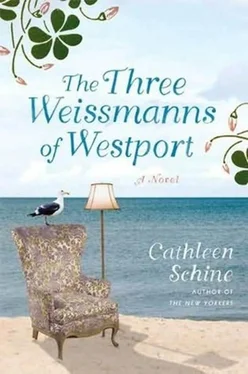"I'll commute. I'll buy a gray flannel suit."
But Charlie was too young to get the reference.
"Right," he said uncertainly.
"I can't believe I let them talk me into this," she said.
"Aunt Miranda could talk anyone into anything."
The packing was what delayed them, though at first Betty was willing to leave with nothing but a toothbrush. After all, what was keeping her? What was left?
"Your life?" Annie ventured.
"My life is over."
"That's very dramatic, Mother."
"Just some saltines for the trip," Betty said. "And a cardigan."
But one sweater led to another, which led to matching skirts and trousers, jackets, shoes, and handbags. "And of course I'll need these," Betty said, gathering photos and several large paintings. "And something to sit on. And sleep on. And cook in. And plates and the teapot… And I'm certainly not leaving the good crystal or the silver…"
In the weeks that followed, the three of them met at the Central Park West apartment to tag furniture and sift through linens and pots and pans.
"It's not as if I'm really moving out," Betty could be heard murmuring. "I'll bring it back again when all this is sorted out."
"If I had a backyard," she said one day, "I could just bury it until I returned."
"After the guns stop? In spite of what Cousin Lou thinks, you're not really a refugee, Mother." Annie was immediately sorry she'd spoken. If her mother could read her tawdry divorce as a heroic wartime thriller, who was she to deprive her of that pleasure? At the same time, though, Annie was exhausted by the giddy self-pity of both her mother and her sister. They seemed to consider this miserable move to be a grand and tragic adventure. Annie envied them, at some level-how could anyone find such heady satisfaction in defeat? But at another level, she had no patience for an attitude that she knew would mean all the decidedly unexciting details, like organizing the mover and ordering packing materials and figuring out how to pay for the unexciting details like the mover and the packing materials, would fall, inevitably, like dead leaves in autumn, to her.
"It's a metaphor," Betty was saying. "You've heard of those, Miss Librarian."
Miranda, who had jammed a straw hat from deep in the closet on top of her head and wrapped herself in a lace tablecloth mantilla, placed herself between the two of them. "Don't fight. The Gypsy family has to stick together."
"The Joad family is more like it," said Annie.
And she could envision them clearly, their mattresses lashed to the roof of the jalopy, making their trek along the dusty roads to labor in the fields of Westport, Connecticut. But she was mollified now, smiling at the thought, for "jalopy" was a word she had always loved.
But even as they packed for their neo-Depression life together, money was in shorter and shorter supply for the three Weissmanns. Joseph and Betty had long ago become accustomed to the bountiful solidity of the upper reaches of the upper middle class. They were, by the standards of any but the rich, rich, and money was a comfort for them, rather than a concern. Betty's shock, now, was real and showed itself primarily in a tendency to undertip.
Things no longer cost what they had when she was young, which was the last time she had taken much notice. She had never paid for anything when living with Joseph. Though not extravagant, considering her age and her class and her economic reality, she had been careless: literally without care. And because she wanted only what was reasonable for someone in her position, there had always been enough to buy what she wanted. Now there was no reason. Or rhyme. Or money.
"You take care of it, dear," she said to Annie.
For many years, for her entire professional life, Miranda had delegated the payment of her bills to her business manager. But now, with the coming of the scandals and their aftermath, the business manager had noticed that there was no money to pay him to pay her bills. He had gently informed Miranda of this fact and gone on his way to pay the bills of more solvent clients. Unfortunately, the bills did not leave with him. Miranda gave up her office, but even then the bills did not stop appearing, following her to her home. Finally, Miranda brought this dogged, insistent pile of bills, this reminder of her failure, these dunning, demeaning messages from a life she had lost, to her mother's apartment on Central Park West. She exiled the depressing long white envelopes, unopened, to Betty's little antique desk in the living room, and there they sat, until Annie could stand it no longer and went through them herself.
It was Annie, then, who worried about money. But Annie was far better at worrying in general, and worrying about money was one of her specialties. She did not resent her mother and sister for dumping their financial load on her back. In fact, she felt better when she was organizing them than when she was taking care of her own insistently precarious business, for her finances, always a juggling act, the nonprofit world seeming to take its mandate seriously and to apply it rigorously to its employees, were now more than ever the stuff of nightmares. And nightmares are what Annie had, some while she was asleep, some while she sat at her desk at the library, some on the subway. The worry would rise, like a damp rotten smell, and she would try to quicken her step, to hurry past it. She would talk herself back to the letter she was answering regarding the library's acquisition of a collection of correspondence, or she would amuse herself with a quote from the man she had chosen as her new role model, Mr. Micawber, and the odor of insolvency would temporarily recede. But later, invariably, the ugly stench would creep back into her consciousness: Nick still in college, Charlie in medical school, all those loans-she tried to help them as much as she could-the maintenance on the apartment up 10 percent, her Con Ed bill through the roof, her phone bills-how could there be so many phone bills for one person-and then the cable bill and the Internet, and every time she went out to dinner, could it really cost fifty dollars for pasta and a glass of wine, and as for retirement, did people really save? How? She had always assumed she would inherit a little something that would help her along in her old age, but no more. Old age was now, too, caught up in the stink of financial worry. She was a successful woman in her early fifties and cutting corners the way she had as a graduate student. She had mortgaged her apartment up to its nostrils and had been living off that money and the home-equity line of credit she was able to get. She had always assumed she could sell her apartment as a last resort. That would be difficult in this market, but even if she did manage to sell it, what then? Where would she go? A person had to live someplace. The way her friends filled out Sudoku grids, in an obsessive attempt to make the numbers come out right and thereby exercise and protect their already failing memories, Annie drew her own grids, adding up mortgage and loan payments and maintenance checks, comparing the total to what she would have to pay in rent, trying to take into account the tax deductions she received because of her mortgage. This was how she put herself to sleep at night, too, or how she kept herself awake, adding, subtracting, sighing, twisting, grimacing in the dark.
Then one evening, when she was packing up her own apartment, boxing all her personal items so that the people coming to sublet it could not snoop through her papers, though why they would want to or what of interest they would find there she really couldn't imagine, Annie found a letter from her grandmother, Betty's mother, who had died ten years earlier.
Darling Annie, it said. Here is a birthday check to celebrate this wonderful day when you turn eleven years old! Use it wisely. Grandpa worked hard so that I would have a cushion to lie back upon. Always remember, dear Annie, these wise words that your grandmother told you: When you have enough money, you can thumb your nose at the world!
Читать дальше












